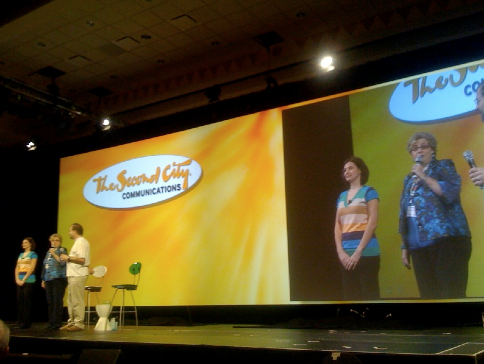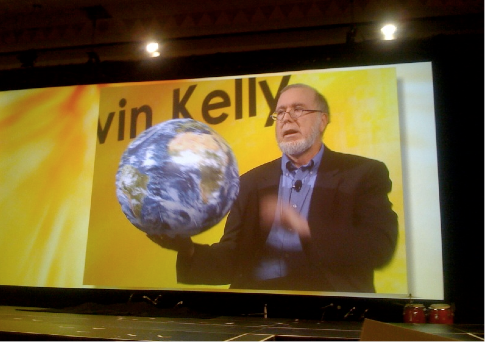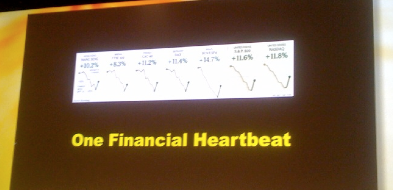On Collaboration Tools of the Future:
Tools we have right now are minimal. Not good in sense that they dont structure the information we are generating. Info needs structure to be readable and parseable. We’ll see tools come along where the structure of the information is parsed and shared.
Example: Parsing out arguments. If you use the word “Pacifica” for my hometown, the machine should know that…because we know that. Tools today are not aware of semantic structure of an argument. Hello Semantic Web ; ) Awareness of structure and interactions of conversations. Meaning of what we are doing is better captured and parsed.
On Global Mind of Technology Enveloping the Globe:
The notion of virtual awareness. Global cloak of information and computers becoming aware. Tool like Google earth can bring to us an awareness of our globe that we could not do before.
Stuart Brand, turn around the cameras in space and take a picture of the whole earth. What we really want is a real time atlas of the world. How many phones, how much fresh water? Any question at global level is “We don’t know” with exception of population and we are even off by 20% plus or minus on that. Helps us get a sense of who we are as a global species.
Is the Semantic Web Inevitable:
Content is machine readable and your profile travels with you and contextualizes the content to your needs. Definition: Web that is readable by the web itself. It can parse out person, place, contextual cues. Like 10 years ago…web itself is 5000 days old. Everything we have seen: Govt forms, phone numbers, ebay, amazon, google earth….all happened in 5000 days.
Who will do all this for free? That impossibility is here with us. One of the things the web has thought us is to believe in the impossible. History of the last 5000 days suggests that almost anything is possible.
Issue with Semantic Web is that content itself needs to be deconstructed into Tripple and then recombined in huge ways. That is the promise of the Semantic Web.
On how to encourage collaboration in the enterprise and encourage more failure
Hard to change enterprises. Changing established process is very hard. Starting anew may be the best way to go. Having an “existance proof” is a very good way to go. Wikipedia is a great “Existance Proof” as is Flicker, as is Linux. Nobody is as smart as everybody. Some are smarter than others. All amateur photographers together are better than a professional photographer.
You can have a group be dumb. No question about it. There is an art to bootstrapping the positive wisdom of crowds as opposed to the negative stupidity of the mob. Great excitement of this age is that we are in a discovery space…..look at auction spaces. We are in a time of great experimentation.
On the Future of Global Dialogue, Deliberation and Decisionmaking
We are far away from it right now. Democracy and voting is a type of conversation with comment every four years. Voting is the most elementary and not most important aspect of democracy which should be a large scale ongoing conversation.
On Sandboxing outside IT and as service to clients.
Convinced that next 10-20 years we will find whole new structures of collaboration. Experiments in org structure and incentives will proliferate. Lot of how we manage today was defined in a world with very little information. That has all changed now. Organization Lab like a media lab is a fantastic idea. First article he wrote was on how scientists got their information. They all worked by pre-prints before the article was published. Look at how people actually work and spend time is a great avenue of research. How we spend time with instruments and people. Add to it the design approach to life. Do something and iterate. Just go and do it.
On Global Trends for Collaboration on Democratization of Content:
Korea and Japan have a mobile thumb culture that is different that US. Inclination for people to operate from where they are (location). Sitting at a desk in the long term will seem charming and archaic. Quickly we will be released from keyboards. Interacting with whole body will not be far behind. You think differently when you are on your feet. Mobility is much more foundational in the asian culture. Experimentations with hoteling and project rooms etc..
On Early Adopters and Getting to Main Street.
How to distinguish what crosses the chasm. Is this going to take off? Same thing with movies/media product. What gets adopted is a combination of all kinds of things. Sometimes in details of execution. Wired magazine…half of the success was in title of the magazine. Think not Have and Have Not versus Have Now and Have Later. Early adopter overpay for everything. Technology is that which does not work yet. Early adopters subsidize have laters.
On Social Network Analysis
Closest tool that he uses is called popurl. That page aggregates all the aggregators. Digg, Boing Boing. Kinda like Alltop. One page about what the web is thinking about.
On whether or not Technology is Morally Neutral
Babies are good. Technology is good. It is inherently positive as a default. Babies can grow up to do bad things…and so can technology. Weapons are technologies that do bad things. What technology brings is possibilities. Technologies are around us to allow us as individuals with our mix of skills and talent to express ourself. Imagine a world where Bethoven was born before the piano, Hitchcock before film. There are people who are being born where we do not have the technology for their genius to emerge exist yet. Brings us choices so chance for our unique genius to emerge.
On William Gibson
Future is here, just not evenly distributed. Not sure on how we distribute the future faster. Future will erupt in odd places of the world where everything is connected. Otherness becomes the most important thing in a globally connected world. Diversity in the workplace is actually a very productive and economically viable value proposition in an economy of ideas.
On Banking Differently
Lot of legal issues associated with this. It will be a while before we see a revolution in global financial system. Nationalism will be around for quite a while.
On the Singularity is Near
Mythic Idea. By 2040 we make an artificial intelligence that is smarter than humans and it can make a superintelligent computer. When we reach period the world changes so much we can’t really figure out what is beyond it.
Ray Kurzweil want to live long enough to be at that period. Artificial Intelligence is inevitible. Still need a great big Hydron Collider and need to do experiments and living tissue and results. Going to take a very long time. Intelligence is multiple. Calculator is smarter than humans in arithmetic. Computers we make will be different than human intelligence. Google is pretty smart allready. Spells, Translates, but completely different than human intelligence. Therefore it is useful to us.
Idea of singularity: Rapture of the Nerds is Mythic. It will never go away. It is based on exponential curves. Therefore it is always be near but never arrive. Wonderful creative idea that will be in our culture for a long time.
On Blogging to Remember and Open Source our Identity.
Who we are and what matters to us is out there on blogs. Can we leverage that for learning. In general, vertical wikis can harness information. I concur with this conference. People meeting face to face is a tool too. Scenario workshops. Unconferences agenda is set by the people attending. Turn a conference inside out by having it made by folks attending: Barcamp, Foocamp.
Not just always online tools. Online and face to face at the same time. Guidelines for blogging a conference (like I am now; )
Embed and augment virtual world and physical world.
On Disintermediation and Governance
Where is governance going? Nations are too big for small problems and too small for big problems. Nations will release some of the things they do to other mediums. A book never wanted to be a phone directory. They all want to be novels. Internet was better suited to being a phone book. Nations will be relieved at not having to do certain things that global network can better handle. Some elements of sovereignty will move out.
On Science Fiction
Don’t read it as much as used to as a kid. Writing in Science Fiction is not good. Great ideas badly written. Deamon by a first time author. Game designer who sets off in an elaborate AI in the network that takes over the world. Turns out to be a good thing. Gets rid of all parasites like spam. Having a Mafia guy in your neighborhood. Neal Stephenson’s new book called Anathem (monks who build a clock of the long now). Tending for the long term responsibly and seriously. Bill Gibson Spook Country: Augmented Reality on glasses and see the material worlds differently (name, room annotated, lines and coordinates).
On Microchipping People
Not me! I hope I am dead before it happens. Not a tatoo or pierce guy. It will most likely happen. We could do bioidentity with Iris’
On Technology Waning Soon
Technology is anything invented after you were born (Alan Kay). Physical shape of cities will not change much. Material revolution has already happened. Most of revolution is in intangible world.


